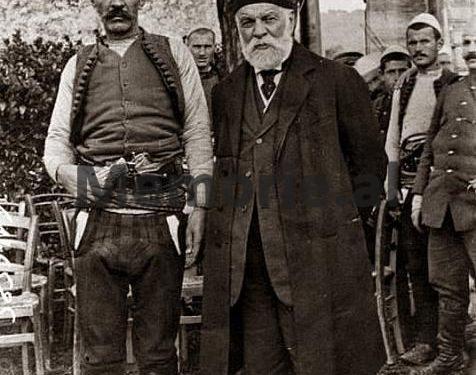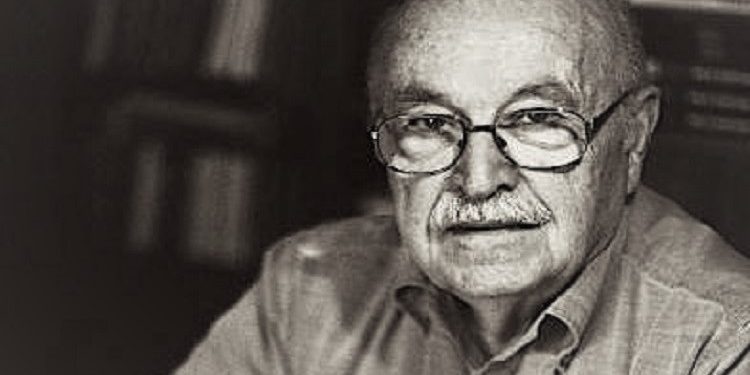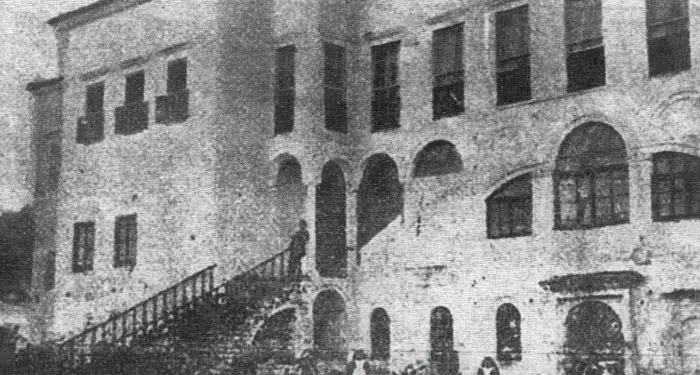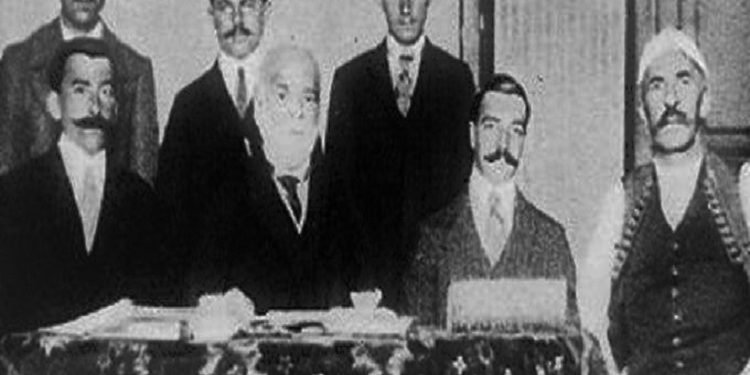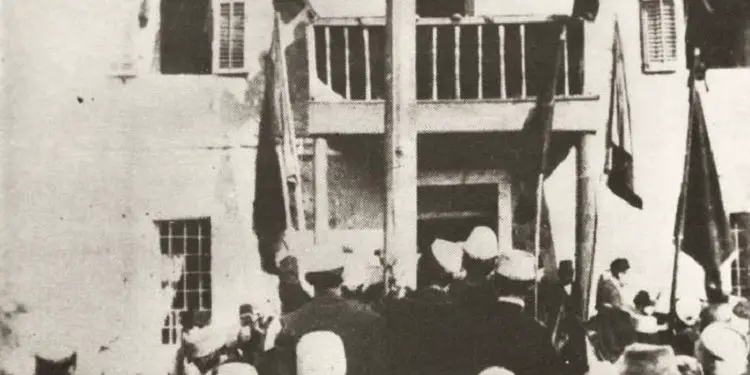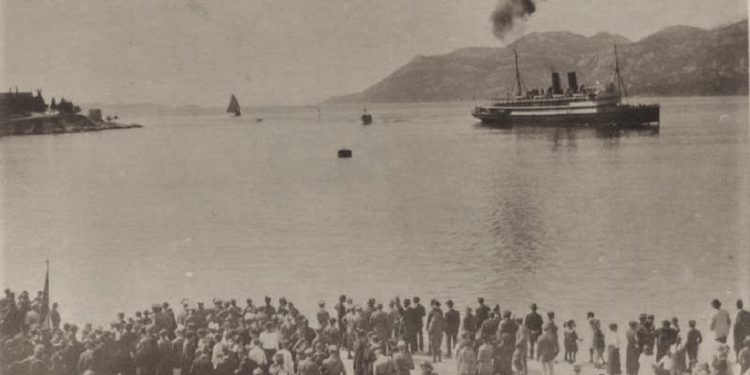By Alexander Meksi
Memorie.al / The Assembly of Vlora and the Declaration of Independence of Albania have always attracted the attention of researchers, but also of the general public, for the importance and historical content, as the meeting that laid the foundations for the creation of the Albanian state, of “non-Warm” Albania ”, as the Declaration of Independence Act itself says. Beyond any doubt; Numerous studies and publications have been carried out on these historic days, the Assembly held from November 28 to December 7, 1912, is known from the publication of the minutes of its seven days, in the newspaper “Birth of Albania” (numbers 6-11 , January-February 1914) directed by Dhimitër Beratti and the reprint after him by Lef Nosi, in his notebooks “Historical Documents” no. 1 (1924) – no. 12(1925).
Both of these distinguished men have been participants of the Assembly since the first day and at the same time signatories of the Act of Independence. Later, there are many researchers who dealt with the Declaration of Independence and the many aspects of that major event, for the history of the Albanian people. Among them we would single out the monographic work of Bardhosh Gaçe; “Those who proclaimed National Independence”, in 2002, where the minutes of the Assembly, the biographies of the participants and the memories of many of the prominent figures of the time are given. It is understood that that event has always taken place in the studies on the history of that period. In the same way, the initiative for the research and publication of historical documentation, which is located in foreign archives, should be mentioned. This will help to better and accurately understand those events, in their political and social aspects.
In the last ten years, there have been constant remarks, non-acceptance of the presence of particular persons in that Assembly, as signatories or participants, most likely as a result of political prejudices. Likewise, there are complete editions of the lists of signatories with photos and short biographies by Niko Kotherja and Admirina Peçi, as well as explanations about the event.
Involved in a collective work, which is also related to this event, we thought to look carefully at all the documentation saved for the Assembly, its works, the participants, the Act of Declaration of Independence and its signatories, as well as the decisions taken, launched out of a desire to be precise. It was necessary to fully study this historical act, very important for anyone who is proud to be Albanian, and the 100th anniversary is such an occasion, based on the documentary material and the memories of the participants and contemporaries.
November 1912 found the Albanian lands as a battlefield; from the North attacked the Serbo-Montenegro troops and the resistance of the regular Turkish army, the reservists and together with them the Albanian volunteers, failed to withstand them. In the South, in the territories of the Prefecture of Ioannina, the Greek army was fighting, while in the East, the Bulgarian troops. At the expense of the Albanians, everyone tried to tear apart what was left of the Turkey of the Young Turks.
In such circumstances, the patriots did not stand idly by and pray, but connected with each other, wherever they were, and decided to become lord of their homeland. In his memoirs, Ismail Qemali gives a brief picture of the activities of the patriots for the defense of the homeland. He shows that; seeing the actions of the “Young Turks”, the Albanians stood up in the General Uprising, which triumphed with their entry into Skopje. But the beginning of the Balkan War convinced the Albanians, as Ismail Qemali notes, “to take strict measures for our salvation”.
He refused the proposal to be part of the new Turkish government and left Istanbul for Bucharest, where he met with the prominent Albanians of the colony and together they decided to return to Albania, to hold a general meeting and announce Independence. From there, Ismail Qemali and his friends went to Vienna and Budapest, where he had high-level meetings with the Minister of Foreign Affairs of Austria-Hungary, Berthtold, and provided support for independent Albania.
Ismail Qemali from Vienna, on November 9, announces by telegram that he left for Albania “on the first steamer”. He makes it clear that; “Albania’s future is secure”.
On November 18, the Parish of Vlora receives a telegram from Ismail Qemali, who tells you that; “I will be there before Friday. The gathering of representatives in Durrës or Vlona is absolutely necessary. Call them all. Until I arrive, keep calm and unity.
Our political opportunity was completely secured”. This notification, with a signed telegram “In the name of everyone”, by Xhemil Bey Vlora, Elmas Kanina and Leonidha Bezhani, is sent to you; To the Mayors of the Municipalities and Clubs, the Presidency and the honest people of Ioannina, Gjirokastra, Filat, Reshadia, Tepelena, Delvina, Permet, Margellichi, Leskovik, Kolonja, Korca, Dibra, Manastir, Resnia, Kostur, Struga, Ohrid, Berat, Pogon , Skrapar, Lushnja, Elbasan, Kavaja, Durres, Tirana, Krua, Mati, Shkodra, Peqin, Fier. In that notice they tell you; “….We pray for the salvation of the motherland, that the representatives in question, we have worked day and night for them, will be present at the General National Meetings, which will be held here in Vlona…”!
In the edition of Lef Nos, there are numerous telegraphic exchanges about the preparations, the delivery of the means of transport to Durrës, the announcements about the names of the representatives from all the Albanian provinces, except for those of the provinces that were mentioned above, from a telegram signed by Mid ‘hat Frashërit, we learn about delegates who will come from Kosovo. It is said that others were going to come, but due to the Serbian occupation, engagement in fighting and the arrests of the leaders, they could not come. In the volume with historical documents, there are numerous telegrams presenting the battles and invasions by foreigners, the turbulent and uncertain state of the country, and the vicissitudes of the delegates’ journeys to Vlora, the replacement in case of impossibility with others, but in any case, it was the primacy that proved this with letters or telegrams.
On November 21, Ismail Qemali and his followers landed in Durrës, after being subjected to the control of the personnel of two Greek warships, which had blocked the port. They spent one day in Durrës, to talk with the local population about saving the Motherland, but since there was no proper reception, telegrams were sent to the Paris of Berat and Elbasan, so that Vlora became the center of the meeting. We also learn this from a telegram dated November 25, 1912 (12 third autumn 1328 H), that the Prefect of Durrës, Mahir, sends to the Command of the Military Body in Janina and the High Gate, where it is said that Ismail Qemali has landed in Durrës on the first day of Eid.
From there came the order to arrest him and Ismail Qemali and his companions continued their journey inland. As is known, they arrived in Vlora on November 25 and decided to meet on the 28th, Thursday, as Qemal Bey Karaosmani tells us, so that all the delegates could meet. The exchange of letters shows that Independence was already decided and the last two days it was announced, raising the red and black flag, with two proud vultures, the citizens of Tirana, Durrës, Elbasan, Kavaja, Peqin and Lushnja.
The first meeting of the Assembly opened on November 28, 1912, at 4 p.m., at the house of Xhemil Bey, Ismail Qemal’s cousin. The meeting was opened by Ismail Qemali, as; its “initiator”, showing the importance of the Assembly. Further; “as required by the rules and custom”, the representation was checked for each delegate. We are giving the names below, adding in brackets the adjectives or nouns by which they are known.
Berat: Iljas Be’ Vrioni, Hajredin Be’ Cakrani, Xelal Be’ Skrapari (Koprencka), Dud (Jorgji) Karbunara, Taq (Dhimitër) Tutulani, Sami Bej Vrioni, who was absent.
Dibra: Mufti Vehbi Efendiu (Agolli),
Durres: Abas Efendiu (Çelkupa), Mustafa Agai (Hanxhiu). Jahja Efendiu (Ballhysa) who was expected to come, as well as Dom Nikoll Kaçorri as; “Envoy of the Archbishop for all Catholic Albanians who are under his command”.
Elbasan: Shefqet Be’ Daiu, Lef Nosi, Qemal Bey (Karaosmani and Midhat Be’ Frashëri.
Gjirokastra: Aziz Efendiu (Gjirokastra). Veli Efendiu (Harçi), Elmas Efendiu (Boce).
Ipeku (Peja): Rexhep Bey (Mitrovica), Bedri Bey (Pejani), Salih Xhuka (Gjuka), Mid’hat Frashëri, these delegates are also from Gjakova, Plava and Gusinja.
Kruja: Abdi Be’ Toptani, Mustafa Asim Efendiu (Kruja).
Lushnja: Kemal Bey (Mullaj), Ferid Be’ Vokopola, Nebi Efendi Sefa.
Ohrid and Struga: Zyhdi Bey (Ohrid), Dr. Myrtezai (Ali Struga), Nuri Efendi Sojliu.
Sh’jaku (Shijaku): Xhemal Bey (Deliallisi), Ymer Bey (Delallisi), Ibrahim Efendiu (Ali Shahini).
Tirana: Abdi Be’ Toptani, Murad Be’ Toptani.
Vlona: Ismail Kemal Bey, Zyhni Efendiu (Kanina, Mustafarai), Aristidh Ruci, Kjazim Kokoshi, Jani Minga, Ekrem Bey (Vlora).
The Albanians of Bucharest: Dhimitër Zografi, Dhimitër Mborja (Emanuil), Dhimitër Beratti, Dhimitër Ilua, who is expected to come. Furthermore, Salih Xhuka, asks to be called the delegate of the besieged Korca: Pandeli Cale, Athanas Floqi, Spiro Ilua, which was accepted. Likewise, Mustafa Asim Efendiu, I request for the same reason that Luis Gurakuqi be recognized as a delegate of Shkodra, which was accepted.
A telegram from Përmet says that if Veli Bey Këlcyra has not come there, Surja Bey Vlora and Mid’hat Bey Frashëri will take his place. It is also announced that Mustafa Barotçiu and Hamdi Bey (Ohri) are coming from Ohrid and Struga.
At the end of this procedure, Rexhep Mitrovica requested that the Speaker of the Assembly be Ismail Kemal Bey, and as the first letter, Luis Gurakuqi and the second letter, Shefqet Daiu, which was accepted with applause.
After these procedures, Ismail Qemali spoke about the situation in Albania and what needed to be done. The Assembly “…after liking the words of His Excellency Ismail Kemal Bey, decided that: Albania should become free and independent from today itself, under a temporary government”.
The delegates then elected Ismail Kemal Beu as President of the Provisional Government and Dom Nikoll Kaçorri as Vice President. After that, the delegates “came outside to greet the flag that was raised at 5:30 in the afternoon”.
The second meeting was held on November 30. The delegates listened to the minutes and approved them. Luis Gurakuqi said that those who will come later will sign these memorial documents at the end, which did not happen. This day, Mehmet Pashë Deralla (Tetova), Isa Beg Buletini, Ajdin Be’ Draga, Dervish Be’ Ipeku, Sami Be’ Vrioni, Dervish Be’ Elbasani (Biçakçiu) and Mahmut Efendi Kaziu came as new delegates from Kosovo. Bake them.
At the proposal of Aziz Efendi Gjirokastra, Kristo Meksi was recognized as the delegate of Tepelena, while at the request of Lef Nos, Sherif Efendi (Langu) was recognized as the delegate of Dibra. After Ismail Qemali was elected the President of the Government, he withdrew from the position of Speaker of the Assembly and with the proposal of Luis Gurakuqi, Mufti Vehbi Efendiu was elected to this post, as well as Lef Nosi, vice president.
The third meeting was held on December 1, under the chairmanship of Mufti Vehbi Efendi. Two other letters were assigned; Mustafa Kruja and Dhimitër Beratti. Based on the proposals, a vote was taken on the number of members of the Eldership and there were debates about this vote, i.e., to vote one for each case, or everyone. As for the election of the Government and Elders, it was left when the other delegates come.
The fourth meeting was called on December 3. Myfit Bey Gjirokastra (Libohova) and Fehmi Efendiu (Mezhgorani) and Kristo Meksi and Aristidh Rucin were appointed delegates from Gjirokastra by telegram. Kavaja also wants to be represented by Abdi Bey Toptani. Other delegates who came were from Gjirokastra, Petro Poga, Jan Papadhopullo, Hysen Efendi Gjirokastra (Hoxha) as well as Veli Bej Klisura. With the proposal of Myfi Bey Gjirokastra (Libohova), Veli Gërra Reshadija, Vesel (Jakup Vesel) Margëlliçi, Aziz Tahir Ajdonati (Tahir Mete) and Rexhep Demi from Filati were called delegates of Chameria. As a delegate of Ipek, Qerim beg (Begolli) was accepted.
In this meeting, Ismail Qemali spoke about the conditions that a minister must fulfill, so that Europe and Istanbul are satisfied: they must be well-known names, inside and outside Albania. He proposed this list: Mehmet Pashë Tetova, Myfit Bej Gjirokastra (Libohova), Aziz Pasha, Vehbi Efendi, Abdi Be’ Toptan and Midhat Frashëri. This was opposed by Dud Karbunara, with the claim that there was no Christian on the list, an opinion supported by Pandeli Cale, Dhimitër Beratti and Qemal Be’ Elbasani (Karaosmani). So the vote was left for the next day.
The fifth meeting was held on December 4 in the presence of 57 delegates (6 missing). In Ismail Qemali, he left the right to choose 8 ministers to the Assembly, with the proposal that 4 should be Christians and 4 Muslims. This proposal was opposed and the selection was left to the vote. With the votes received, 5 people won first: Luis Gurakuqi with 54 votes, Mufit Be’ Gjirokastra (Libohova) 52, Mehmet Pashë Tetova 42, Abdi Be’ Toptani 34, Mid’hat Bej Frashëri 35. These were elected because they won more than half of the votes. Therefore, a second vote was held, with a list, where there were the 12 names that we had voted for, from which the winners were chosen; Petraq Poga with 40 votes, Pandeli Cale with 39 and Lef Nosi with 37.
After that, the election of Eldership took place, where according to Dhimitër Beratt’s proposal, only one vote was taken. Elected: Iljas Be’ Vrioni with 55 votes, Sami Be’ Vrioni 54, Dud Karbunara 48, Mustafa Asim Kruja 42, Murat Be’ Toptani 42, Eqrem Be’ Vlora 40, Mufti Vehbi Efendi 39, Kristo Meksi 39, Dhimitër Berati 38 , Dhimitër Zografi 35, Bedri Be’ Ipeku 35, Sali Gjuka 35, Veli Be’ Klisura 32, Hajredin Be’ Cakrani 32, Xelal Be’ Skrapari (Koprencka) 30, Shefqet Daiu 30, Dervish Be Elbasani 29 and Ajdin Be’ Draga 27 We note that the minutes also show how the other votes were distributed for the ministers, while for the Elderly, for all those who received more than 10 votes.
The sixth meeting was held on December 6. In this meeting, it was decided that the Government has as its burden the protection of the Albanian issue, before Europe. Ismail Bey says that the government intends to issue a pardon. Other procedural issues were discussed and it was said that; since now the Government started work, the Assembly will last two days.
The seventh meeting was held on December 7. At the beginning of it, it was announced that the delegates, Mr. Ahmet Muhtar Bey (Zogolli), Riza Bey and Kurt Agai, as well as Mustafa Efendiu (Barotçiu) from Starova, and Hamdi Bey (Ohri) from Ohrid, have arrived from Mati, while they are expected to come, also Dervish Hima from Ohrid and Hajdar Blloshmi from Starova, who apparently failed to appear. The meeting discussed some procedural issues of the relations of the Eldership with the Government. After that, the Assembly closed its work.
The government formed in Vlora had the following composition:
Prime Minister and Minister of Foreign Affairs, Ismail Kemal Bey;
Deputy Prime Minister, Dom Nikollë Kaçorri;
Minister of Education, Luis Gurakuqi;
Minister of Internal Affairs, Myfit Bej Gjirokastra (Libohova);
Minister of Finance, Abdi Bey Toptani;
Minister of War, Mehmet Pashë Dëralla (Tetova);
Minister of Justice, Petraq Poga;
Minister of World Affairs, Mid’hat Frashëri;
Minister of Agriculture, Pandeli Cale;
Minister of Posts and Telegraphs, Lef Nosi
Since those historic days, a century has passed and we, all the Albanians who live today in our lands, and everywhere in the world, are lucky to celebrate this anniversary, remembering all those men who over the centuries tried for an Albania freedom of the Albanians and who finally achieved it, even though this independence was lacking. 13 years ago, Kosovo gained its independence, while in the coming years; there will certainly be other events that depend not only on us but also on us.
***
List of participants in the Assembly of Vlora, from November 28 to December 7, 1912.
We are listing them according to their arrival in the works of the Assembly, but, making two clarifications: on the first day, two delegates who did not sign the Act were present and apparently left, while the others signed; we also have four delegates, announced during the meetings of the Assembly, as such they could not arrive before the works were closed on December 7, we add that there are also cases where there are delegates (two), who are mentioned by name, when they are absent or when they have received votes as in the case of Eldership, but their arrival has not been announced. So there may be some reservations about the accuracy of the minutes. For our part, we call that minutes regular.
Signatories of the Act of Independence:
Ismail Kemal Bey, Ilias Be’ Vrioni, Hajredin Be’ Cakrani, Xelal Be’ Skrapari (Koprencka), Dud (Jorji) Karbunara, Taq (Dhimitër) Tutulani, Mufti Vehbi Efendiu (Agolli), Abas Efendi (Çelkupa), Mustafa Agai ( Hanxhiu), Dom Nikoll Kaçorri, Shefqet Be’ Daiu, Lef Nosi, Qemal Bey (Karaosmani), Midhat Be’ Frashëri, Veli Efendiu (Harçi), Elmas Efendiu (Boce), Rexhep Bey (Mitrovica), Bedri Bey (Pejani), Salih Xhuka (Gjuka), Abdi Be’Toptani, Mustafa Asim Efendiu (Kruja), Kemal Bey (Mullaj), Ferid Be’ Vokopola, Nebi Efendi Sefa (Lushja), Zyhdi Bey (Ohri), Dr. Myrtezai (Ali Struga), Nuri Efendi Sojli, Xhemal Bey (Deliallisi), Ymer Bey (Deliallisi), Zyhni Efendiu (Kanina, Mustafaraj), Aristidh Ruci, Kjazim Kokoshi, Jani Minga, Dhimitër Zografi, Dhimitër Mborja (Emanuil), Dhimitër Beratti , Pandeli Cale, Athanas Floqi, Spiro Ilua, Luis Gurakuqi.
Other participants, according to the date of presentation to the Assembly:
Aziz Efendiu (Gjirokastra), Ibrahim Efendiu (Ali Shahini), these two were present since the 28th but did not sign: Mustafa Agai (Hanxhiu), Jahja Efendiu (Ballhysa), Mehmet Pashë Deralla (Tetova), Isa Beg Buletini, Ajdin Be’ Draga, Dervish Be’ Ipeku (Begolli), Surrja Be’ Vlora, Sami Be Vrioni, Dervish Be’ Elbasani (Biçakçiu), Mahmut Efendi Kaziu, Kristo Meksi, Sherif Efendiu (Langu), Myfit Bey Gjirokastra (Libohova), Petro Poga, Jan Papadhopullo, Hysen Efendi Gjirokastra (Hoxha), Veli Bey Klisura, Veli Gërra Reshadia, Vesel (Jakup Vesel) Margelliçi, Aziz Tahir Ajdonati (Tahir Mete), Rexhep Demi, Qerim Beg (Begolli), Avni Bey Delvina, Hamdi Be’ Ohri, Mustafa Efendiu (Barotçiu), Ahmet Muftar Bey (Zogolli), Riza Bey, Kurt Agai, Zenel Be Ipeku (Begolli), Riza Beg Gjakova.
Delegates who did not arrive on time:
Ekrem Be’ Vlora, Dervish Hima, Hajdar Blloshmi and Dhimitër Ilo.
From the data that the minutes give us, supplementing the names with the data of Bardhosh Gaçe and other researchers, and especially the memories of contemporaries, we think that we have a complete picture of the works and participants of the Historical Assembly of Vlora, which declared Independence of Albania. So we have 40 signatories of the Act, 42 other participants and 4 delegates, who did not come on time, a total of 76 names of men, whom history should mention and honor.
As Luigj Gurakuqi said in one of the sessions, the minutes and the act were to be signed at the end, it seems this was not done; maybe they did not give it the importance it has for us today. Our opinion is that all these distinguished men are equal before the Nation for the Declaration of Independence, and the raising of the Red and Black Flag, and should be honored equally. They came to make the official Act, in the name of the people who chose them to represent, that they had made the decision in time; even some of the free cities had raised the flag celebrating independence.
***
Finally, we want to address the true picture of the Act of Declaration of Independence. We knew it until recently, according to the traditional photo published by Lef Nosi, where all the signatures can be seen. Before long, the passionate researcher of history and old photographs, Niko Kotherja, published that Act, in the view in which it was exhibited in 1937, in the 25 years of Independence. That photo belongs to the famous artist, Kel Marubi, who photographed it on that occasion. The photograph is of particular importance, to create the true image, until one day you come across the original square.
According to her, it is clear that on the front side of the sheet, there were only the Declaration of Independence and 34 signatures, while on the back side of the sheet, the last 6 signatures. This is shown by the photo of the exposed sheet, in the explanation of which it is said that; “On the next page, there are these signatures: Mustafa Asim Kruja – Ferid Vokopola – Ymer (Deliallisi) – Xhemal Bey (Deliallisi) – Nebi Sefa Lushja – Zuhdi Ohria”.
We thank the “Marubi” National Photo Gallery in Shkodër, which enabled us to have this photograph. With that as a base, we reconstructed the appearance of the reverse page, turning it over, so we kept the damage and folds in their places, we placed as they are together, the last six signatures, and the ones that the caption and photo show that they are on the back side of the exposed sheet. In a careful look at the photo, you can see the dashes on the paper, like in school notebooks. Apparently, Lef Nosi has assembled all the signatures in a single photo, adding below those that were on the back, to have a complete vision of the document. We think it should be replaced by this reconstruction of it, which is closer to the truth. Memorie.al
Tirana, November 2012




